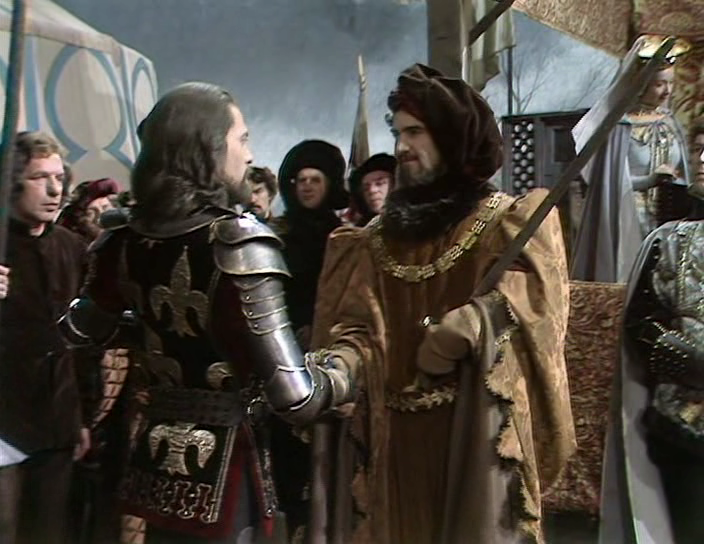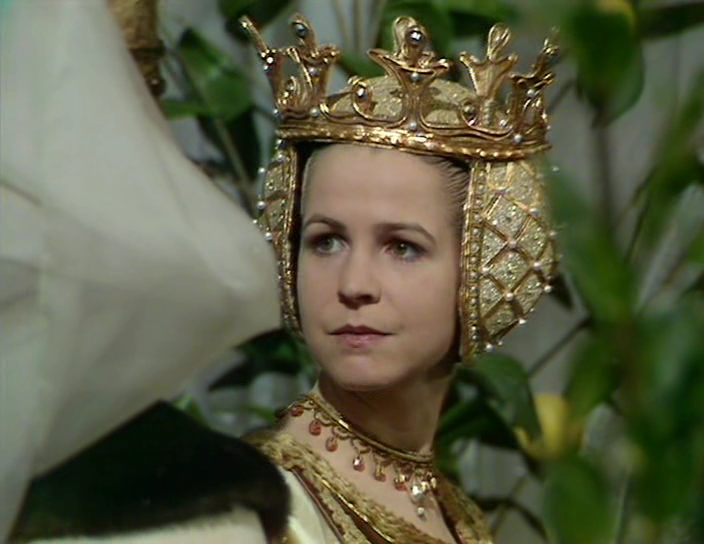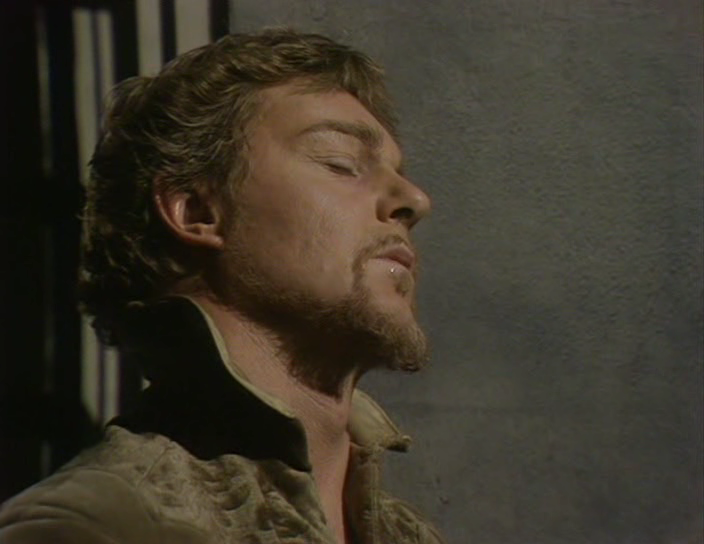

Making its debut with Romeo and Juliet on 3 December 1978, and concluding nearly seven years later with Titus Andronicus on 27 April 1985, the BBC Television Shakespeare project was the single most ambitious attempt at bringing the Bard of Avon to the small screen, both at the time and to date.
Producer Cedric Messina was already an experienced producer of one-off television Shakespeare presentations, and was thus ideally qualified to present the BBC with a daunting but nonetheless enticingly simple proposition: a series of adaptations, staged specifically for television, of all 36 First Folio plays, plus Pericles (The Two Noble Kinsmen was considered primarily John Fletcher's work, and the legitimacy of Edward III was still being debated).
The scale of Messina's proposal, far greater than that of previous multi-part Shakespeare series such as An Age of Kings (BBC, 1960) and Spread of the Eagle (BBC, 1963), required an American partner in order to guarantee access to the US market, deemed essential for the series to recoup its costs. Time-Life Television agreed to participate, but under certain controversial conditions - that the productions be traditional interpretations of the plays in appropriately Shakespearean period costumes and sets, designed to fit a two-and-a-half-hour time slot.
The running-time requirement was swiftly jettisoned when it became clear that the major tragedies in particular would have suffered severely, but other artistic restrictions remained largely in place throughout. Although later productions under Messina's successors Jonathan Miller and Shaun Sutton would be more experimental, Miller was unable to persuade first-choice directors such as Peter Brook and Ingmar Bergman to take part, and Michael Bogdanov resigned from Timon of Athens (eventually tx, 4/16/1981, with Miller himself directing) after his modern-dress interpretation was considered too radical a departure.
This gave the BBC Television Shakespeare cycle the reputation of being overly staid and conventional, which was not always deserved. Though Messina's own productions (1978-80) were largely conservative, Jonathan Miller (1980-82) revamped things both visually (thanks to a design policy of sourcing sets and costumes from great paintings of the era in which the play was set) and in terms of direction and casting, in some cases using popular actors with little or no Shakespeare experience (John Cleese as Petruchio, Bob Hoskins as Iago) to attract new and younger audiences.
Under Miller, directors such as Jack Gold, Jane Howell and Elijah Moshinsky were encouraged to be more adventurous, with Howell in particular adopting such a stylised approach for The Winter's Tale (tx. 8/2/1981) and the Henry VI/Richard III cycle (tx. 2-23/1/1983) that they pushed the definition of "traditional" to the limit, but also garnered the series some of its best reviews. Miller's aesthetic policies continued under Shaun Sutton (1982-85), who brought the project to a belated close.
Whatever its artistic reputation, there was no doubt that the BBC Television Shakespeare was a commercial triumph, breaking even financially by 1982 (ahead of expectations) and fully justifying Messina's gamble. Its success was helped by the rapid growth of video recorders in schools, creating a secondary market that was much bigger than initially predicted - though the initial decision to sell the plays only as a complete set provoked complaints from people who baulked at paying the substantial asking price because they were after a smaller selection or individual titles. The BBC eventually released some of the more popular titles separately, but it was not until late in 2005 that the entire series was available individually on DVD at a competitive price.
Although the BBC Television Shakespeare project as a whole met with a mixed reception, it had several positive virtues. Chief among them was the fact that its completist remit meant that several of the more obscure plays received their first television adaptation, and in most cases the BBC version remains the only one. Happily, such productions as Henry VIII (tx. 25/2/1979), Cymbeline (tx. 10/7/1983), Pericles (tx. 11/6/1984) and Titus Andronicus were considered amongst the cycle's most impressive achievements, with Henry VIII subsequently voted the best production of all by the Shakespeare Association of America.
A complete list of BBC Television Shakespeare productions is as follows:
Series One (producer: Cedric Messina): Romeo and Juliet (tx. 3/12/1978), Richard II (tx. 10/12/1978), As You Like It (tx. 17/12/1978), Julius Caesar (tx. 11/2/1979), Measure For Measure (tx. 18/2/1979), Henry VIII (tx. 25/2/1979)
Series Two (p. Cedric Messina): Henry IV Part One (tx. 9/12/1979), Henry IV Part Two (tx. 16/12/1979), Henry V (tx.23/12/1979), Twelfth Night (tx. 6/1/1980), The Tempest (tx. 27/2/1980), Hamlet (tx. 25/5/1980).
Series Three (p. Jonathan Miller): The Taming of the Shrew (tx. 23/10/1980), The Merchant of Venice (tx. 17/12/1980), All's Well That Ends Well (tx. 4/1/1981), The Winter's Tale (tx. 8/2/1981), Timon of Athens (tx. 16/4/1981), Antony and Cleopatra (tx. 8/5/1981)
Series Four (p. Jonathan Miller): Othello (tx. 4/10/1981), Troilus and Cressida (tx. 7/10/1981), A Midsummer Night's Dream (tx. 13/12/1981)
Series Five (p. Jonathan Miller, Shaun Sutton): King Lear (tx. 19/9/1982), The Merry Wives of Windsor (tx. 28/12/1982), Henry VI Part One (tx. 2/1/1983), Henry VI Part Two (tx. 9/1/1983), Henry VI Part Three (tx. 16/1/1983), Richard III (tx. 23/1/1983), Cymbeline (tx. 10/7/1983)
Series Six (p. Shaun Sutton): Macbeth (tx. 17/10/1983), The Comedy of Errors (tx. 24/12/1983), The Two Gentlemen of Verona (tx. 27/12/1983), Coriolanus (tx. 21/4/1984), Pericles (tx. 11/6/1984)
Series Seven (p. Shaun Sutton): King John (tx. 24/11/1984), Much Ado About Nothing (tx. 30/11/1984), Love's Labour's Lost (tx. 5/1/1985), Titus Andronicus (tx. 27/4/1985)
The BBC also produced Shakespeare in Perspective, an accompanying series of 25-minute personal introductions to individual plays by an eclectic range of presenters from the literary (Anthony Burgess, Dennis Potter, Jilly Cooper) to the scholarly (Germaine Greer, Frank Kermode, Michael Wood) to the celebrity (Roy Hudd, George Melly, Barry Took). These usually took the form of straight-to-camera addresses from assorted locations with some connection to the play, which were intercut with extracts from the accompanying BBC Shakespeare production, usually screened later that evening.
Michael Brooke
For the BBC Television Shakespeare, tx. 10/12/1978, colour, 157 mins
Director David Giles
Production Companies BBC Television, Time-Life Television
Producer Cedric Messina
Script Editor Alan Shallcross
Designer Tony Abbott
Music Adviser David Lloyd-Jones
Cast: Derek Jacobi (King Richard), John Gielgud (John of Gaunt), Jon Finch (Henry Bolingbroke), Wendy Hiller (Duchess of York), Charles Gray (Duke of York), Mary Morris (Duchess of Gloucester)
The story of King Richard II, and how he was deposed, replaced and finally murdered, brought down by his failings both as a king and as a man.

The second entry in the BBC Television Shakespeare cycle, Richard II (BBC, tx. 10/2/1978) boasted one of the most distinguished casts of the entire project, with Derek Jacobi in the title role, John Gielgud (whose involvement with the play dated back to 1929) as John of Gaunt, Charles Gray and Wendy Hiller adding depth and shading to the normally thankless parts of the Duke and Duchess of York, and Jon Finch, formerly Polanski's Macbeth, as Richard's suitably saturnine nemesis Bolingbroke, the future Henry IV.
Fittingly, in a play that consists entirely of verse (at least a quarter of it rhyming), director David Giles and designer Tony Abbott decided against shot-on-location realism, a dominant feature of the BBC cycle's first season. Instead, they staged the play in studio sets that emphasised the formal and ritualised aspects without resorting to the kind of symbolic stylisation that Jane Howell's productions of the Henry VI/Richard III cycle would adopt later on.

This unfussy visual approach emphasises the original text and its delivery, Giles' preference for medium shots and close-ups (the only significant exception being the scene where Richard confronts his would-be usurpers from his castle ramparts, where extreme long shots emphasise his shrunken political stature) further underlining that this is as much a psychological as a political drama, at its most effective when focusing on individuals.
Richard II is one of Shakespeare's most difficult roles. Although childish, petulant, arrogant, blinded by the belief in his divine right to rule, and fatally unable to empathise with his too-casually-banished subjects, he nonetheless attains something close to authentically tragic stature as he muses in his prison cell on the path his life has taken and what it has taught him (Giles imaginatively stages this not as a single speech but as a series of dissolves, suggesting gradually increasing self-awareness over time). Rightly, Jacobi makes little attempt at playing for sympathy, his finely nuanced delivery of some of Shakespeare's most beautiful verse counterbalancing the character's many failings.

Almost exactly a year after its first broadcast, Richard II was repeated as a lead-in to the two Henry IV plays and Henry V, effectively screened as a weekly four-part serial in the run-up to Christmas 1979. David Giles directed all four productions, with many actors (notably Jon Finch) playing the same roles to ensure consistency. Derek Jacobi's second and final performance for the BBC Television Shakespeare would be as Hamlet (tx. 25/5/1980).
Michael Brooke
http://rapidshare.com/files/116893431/RICHARD_II_BBC.part01.rar
http://rapidshare.com/files/116894028/RICHARD_II_BBC.part02.rar
http://rapidshare.com/files/116894638/RICHARD_II_BBC.part03.rar
http://rapidshare.com/files/116895175/RICHARD_II_BBC.part04.rar
http://rapidshare.com/files/116895630/RICHARD_II_BBC.part05.rar
http://rapidshare.com/files/116896189/RICHARD_II_BBC.part06.rar
http://rapidshare.com/files/116896765/RICHARD_II_BBC.part07.rar
http://rapidshare.com/files/116897396/RICHARD_II_BBC.part08.rar
http://rapidshare.com/files/116898075/RICHARD_II_BBC.part09.rar
http://rapidshare.com/files/116898639/RICHARD_II_BBC.part10.rar
http://rapidshare.com/files/116899229/RICHARD_II_BBC.part11.rar
http://rapidshare.com/files/116899795/RICHARD_II_BBC.part12.rar
http://rapidshare.com/files/116899905/RICHARD_II_BBC.part13.rar
no pass



0 comments:
Post a Comment